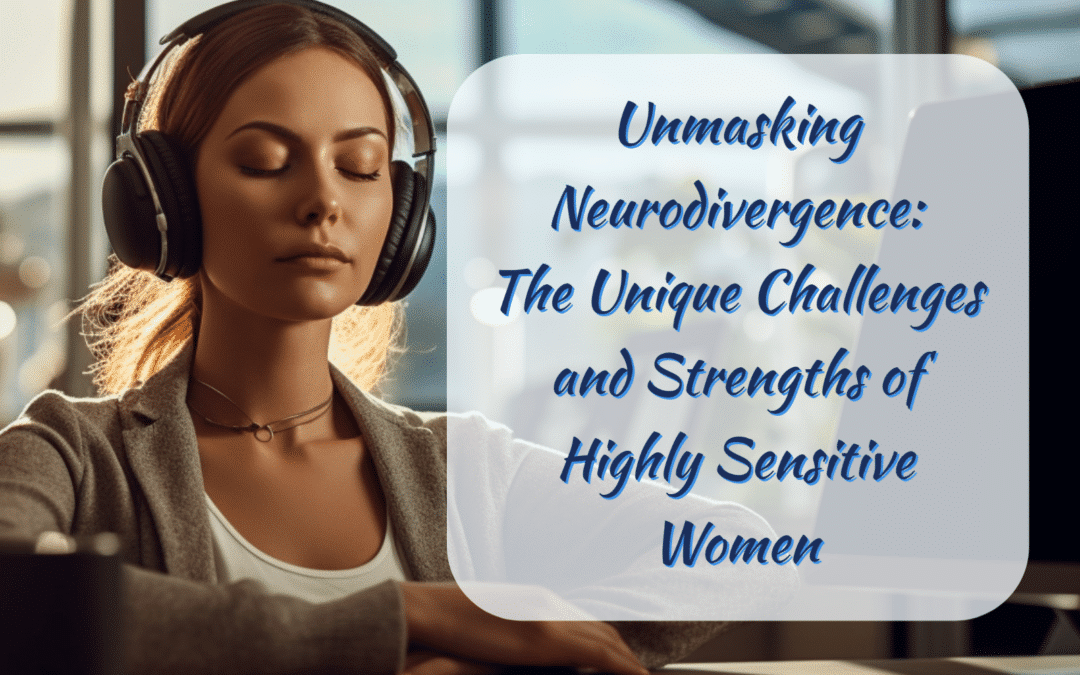Unmasking Neurodivergence: The Unique Challenges and Strengths of Highly Sensitive Women
Sensitive Neurodivergent Women
Individuals with neurodiversity often exhibit unique cognitive functions that set them apart from those with neurotypical brain patterns. In particular, neurodivergent women frequently encounter heightened sensitivities, which can be classified under ‘social cognition’ and ‘sensory processing.’ These heightened sensitivities can lead to overwhelming feelings of stress, anxiety, and emotional discomfort. Known as hyper-empathy and sensory processing sensitivity, these women experience a heightened awareness of both emotional and sensory inputs. This increased sensitivity can result in emotional exhaustion or sensory overload if not managed properly. Unfortunately, these traits are often misunderstood or misdiagnosed, leaving many neurodivergent women without the support they need. However, with effective coping strategies, women with neurodiversity can navigate their heightened sensitivities and lead balanced, fulfilling lives.
Importance of Acceptance
Recognizing the impact of neurodivergence on heightened sensitivities is the foundational step in formulating targeted coping strategies for emotional regulation and sensory processing. Acceptance of one’s neurodiversity not only paves the way for effective self-care routines but also facilitates the adaptation of sensory-friendly environments. Neurodivergent women should embrace the understanding that their unique cognitive patterns are not a weakness but rather an alternative lens through which they experience and interpret the world. By doing so, they can implement practical strategies for stress management and emotional well-being, transforming challenges into opportunities for growth and fulfillment.
Techniques to Manage Anxiety
Cognitive-behavioral therapy (CBT) serves as a highly effective approach for managing both emotional and sensory overload, especially among neurodivergent women. This evidence-based therapeutic method helps individuals identify and reframe negative thought patterns that contribute to undesired feelings or behaviors. By adopting CBT strategies, neurodivergent women can gain a toolbox for managing intense emotional experiences and sensory overstimulation. Key skills may include recognizing emotional or sensory triggers and employing relaxation techniques like deep breathing or progressive muscle relaxation.
Mindfulness practices offer another potent tool for managing heightened sensitivities. This mental discipline involves directing one’s focus to the present moment while practicing non-judgmental awareness. For neurodivergent women, mindfulness can serve a dual purpose. Firstly, it fosters self-compassion by promoting the acceptance of unique emotional experiences. Secondly, it enhances the individual’s capacity to endure distressing emotions and sensations without becoming overwhelmed, thereby boosting emotional regulation and resilience.
The role of social support should not be underestimated in the coping arsenal for neurodivergent individuals. Building connections with others who share similar neurodivergent traits can provide invaluable validation and a sense of communal understanding. Online forums, specialized support groups, and advocacy organizations related to neurodiversity offer safe spaces for discussing personal experiences, sharing coping strategies, and receiving emotional support.
Sensory-friendly Environment
Finally, crafting a sensory-friendly environment is a pivotal strategy for reducing sensory overload, a common issue among those with heightened sensitivities. This type of environment often includes the use of noise-canceling headphones to minimize auditory distractions in noisy areas, such as public transportation or crowded malls. Opting for comfort-driven clothing made from skin-friendly fabrics like organic cotton can significantly lower tactile sensitivities. Moreover, adopting a lifestyle that emphasizes regular exercise and a balanced diet can be incredibly effective for stress management and overall well-being. Such an approach not only aids in emotional regulation but also enhances cognitive function, making it a holistic solution for managing sensory processing sensitivity and emotional discomfort.
Conclusion
In conclusion, managing heightened sensitivities in neurodivergent women presents its own set of unique challenges. However, through awareness, acceptance, and the implementation of effective coping strategies like Cognitive-behavioral therapy and mindfulness, these women can navigate their sensory and emotional landscapes with resilience and poise. Their neurodivergence offers them a unique world perspective that, when properly harnessed, can be a valuable asset. This perspective can fuel creativity, boost empathy, and promote a deep understanding of the complexities of human emotion and interaction.
- Sensitive Neurodivergent Women: Heightened sensitivities in social cognition and sensory processing can lead to sensory overload. Effective coping is essential for a balanced life.
- Importance of Acceptance: Acceptance of neurodivergence enables effective coping strategies and sensory-friendly adaptations.
- Techniques to Manage Anxiety: Cognitive-behavioral therapy (CBT) and mindfulness are key tools for emotional and sensory management. Building supportive communities offers validation.
- Sensory-friendly Environment: Reducing sensory overload involves using noise-canceling headphones, comfort-driven clothing, and a healthy lifestyle.
- Conclusion: With the right strategies, neurodivergent women can harness their unique perspective as a strength, enriching their experiences.


Recent Comments